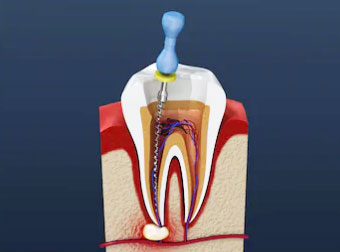
Root Canal Treatment
A root canal is a dental procedure used to treat infection or damage to the soft tissue inside a tooth (pulp). The procedure removes the damaged or infected tissue, preserving the tooth and preventing further damage or infection. Root canals can help you save a tooth that might otherwise need to be extracted.
When a tooth's pulp becomes infected, it can lead to pain, swelling, and even an abscess. A root canal eliminates the infection and restores the health of the tooth. The procedure is often necessary for teeth that are severely decayed or damaged due to trauma or infection.

Root canal treatment is a safe and
effective way to save a damaged tooth.
Learn more about the procedure
- Relieves pain and eliminates infection
- Helps save the natural tooth
- Restores tooth function and appearance
- Quick and minimally invasive procedure
Some Facts to Remember
A root canal is done to save a tooth by removing the infected or damaged pulp inside. This prevents the infection from spreading and helps maintain the integrity of the jaw. If a tooth is extracted instead, the space left behind could cause adjacent teeth to shift, leading to more dental issues. Crowns are often placed after a root canal to restore the tooth's shape and function.
More Information
What Is A Root Canal?
A root canal is a procedure used to remove infected or damaged pulp from the inside of a tooth. The space is then cleaned, disinfected, and sealed to restore the tooth.
Is A Root Canal Painful?
Root canal treatments are usually no more painful than having a filling placed. Anesthesia is used to numb the area, and most patients experience little discomfort during the procedure.
How Long Does A Root Canal Take?
Typically, a root canal treatment takes one or two visits, with each visit lasting about 60 to 90 minutes. The exact duration depends on the complexity of the case.
What Are The Aftercare Instructions For A Root Canal?
After a root canal, you may experience some tenderness, which usually resolves within a few days. It's important to avoid chewing on the treated tooth until it's fully restored with a crown. Follow your dentist's aftercare instructions for the best results.